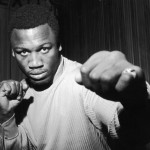The “Little Guy” Won Every Round
Thursday, November 10th, 2011
By Michael Kaufman
“Bum decision,” said my father. “The little guy won every round!” The “little guy” was 20-year-old Joe Frazier. It is hard to think of a man who stands at 5’ 11” and weighs 205 lbs. as “little,” but that is how it looked that summer day in 1964 at the Singer Bowl on the grounds of the New York World’s Fair. That was the site for the finals of the U.S. Olympic boxing trials. Winners in their respective weight divisions would go on to represent the U.S. at the Olympic Games in Tokyo. The heavyweights fought last.
Frazier’s opponent was Buster Mathis, some four inches taller and nearly 100 pounds heavier. Most of the pre-fight buzz had focused on Mathis, especially because he had beaten Frazier in one previous meeting that year—Frazier’s only loss as an amateur prior to the Olympic tournament. Mathis had cruised to the finals, dominating smaller opponents.
We had ringside seats. My father was a knowledgeable boxing aficionado and enjoyed sharing stories with me about his favorite fighters, such as Joe Louis, Benny Leonard and Sugar Ray Robinson. As a young man he had enjoyed putting on the gloves and sparring with his friends until one day he broke the nose of his best friend Abe Bolker, and he never boxed again. Yet he always spoke proudly of his younger brother, my uncle Willie, who was a boxer in the Navy during World War II. And he still followed the so-called “sweet science” or “manly art of self defense,” as boxing was often called.
My first memory of boxing is the Rocky Marciano-Joe Louis fight in October 1951, when I was 5. I watched on a 10-inch TV screen with my father and uncles at my aunt Sadye and uncle Joe’s house in Far Rockaway. Everyone was sad. I didn’t understand what Uncle Willie meant when he said of Louis, “He’s a shell.” A shell was something you found at the beach. By 1951 Louis was years past his prime and fought only because he desperately needed the money.
Some 47 years after the Frazier-Mathis fight in the Olympic trials a few memories still stand out. Mathis was extraordinarily fat. He towered over Frazier but the feisty “little guy” was not intimidated and was the aggressor throughout. My father said the judges almost always prefer the aggressor to a fighter forced to be on the defensive for most of a fight. A rare exception was Muhammad Ali, who we watched train for his first fight with Sonny Liston in 1962. The first day we saw Ali (then still known as Cassius Clay) spar at the Fifth Street Gym in Miami Beach my father said, “This guy has no chance. Nobody ever won a championship fight backing away all the time.” But by the end of the second day he changed his mind: “This kid is gonna beat Liston. I’ve never seen a heavyweight with such quick hands and feet!” Few experts agreed. The final odds for that fight were something like 8-1 in favor of Liston.
Mathis wore his trunks very high in his fight with Frazier in the Olympic trials. He looked comical but it served him well: When Frazier hit Mathis with legitimate body shots, the referee warned him about low blows. In the second round, he penalized Frazier two points for hitting below the belt. Frazier would say later, “In a three-round bout a man can’t afford a points-deduction like that.” Despite losing the second round because of the deduction, Frazier was a clear winner in the eyes of almost everyone but the judges. The decision was heartily booed.
“All that fat boy had done was run like a thief,” Frazier complained. “Hit me with a peck and backpedal like crazy.” When Frazier returned home to Philadelphia he was so upset that he considered giving up boxing altogether. But his manager Duke Dugent and trainer Yank Durham convinced him to make the trip to Tokyo as an alternate in case something happened to Mathis. Good thing they did. Mathis injured his hand and couldn’t compete. Frazier went on to win the gold medal.
Frazier and Mathis would fight again as professionals four years later at Madison Square Garden, and again there were some dubious aspects to the matchup. By then Ali had been stripped of his title for refusing induction into the Army during the war in Vietnam. The Frazier-Mathis fight was proclaimed a “world championship” match by the New York State Athletic Commission. To be honest, I don’t remember the fight as much as I remember the way Jimmy Cannon, a sports-writing legend, spat on the sidewalk as Leonard Shecter and I walked past him on our way in to the arena.
Mathis again wore his trunks high but this time it didn’t help. A relentless Frazier wore down the bigger, heavier man, and the fight was stopped in the 11th round. From 1968 to 1970, Frazier made six defenses, including a fifth-round TKO of World Boxing Association champ Jimmy Ellis in a “unification” fight. But everyone knew who the real champion was, and in the summer of 1970 public pressure forced the overseers of boxing to grant Ali a license to fight again. Demand quickly grew for a showdown between the undefeated champion and Frazier.
Ali knocked out top contenders Jerry Quarry and Oscar Bonavena, setting the stage for one of the most anticipated heavyweight title fights in boxing history. I was privileged to cover those and many other memorable boxing events. But I haven’t watched a fight in years. I’ll explain why in my next post.
Michael can be reached at michael@zestoforange.com.
